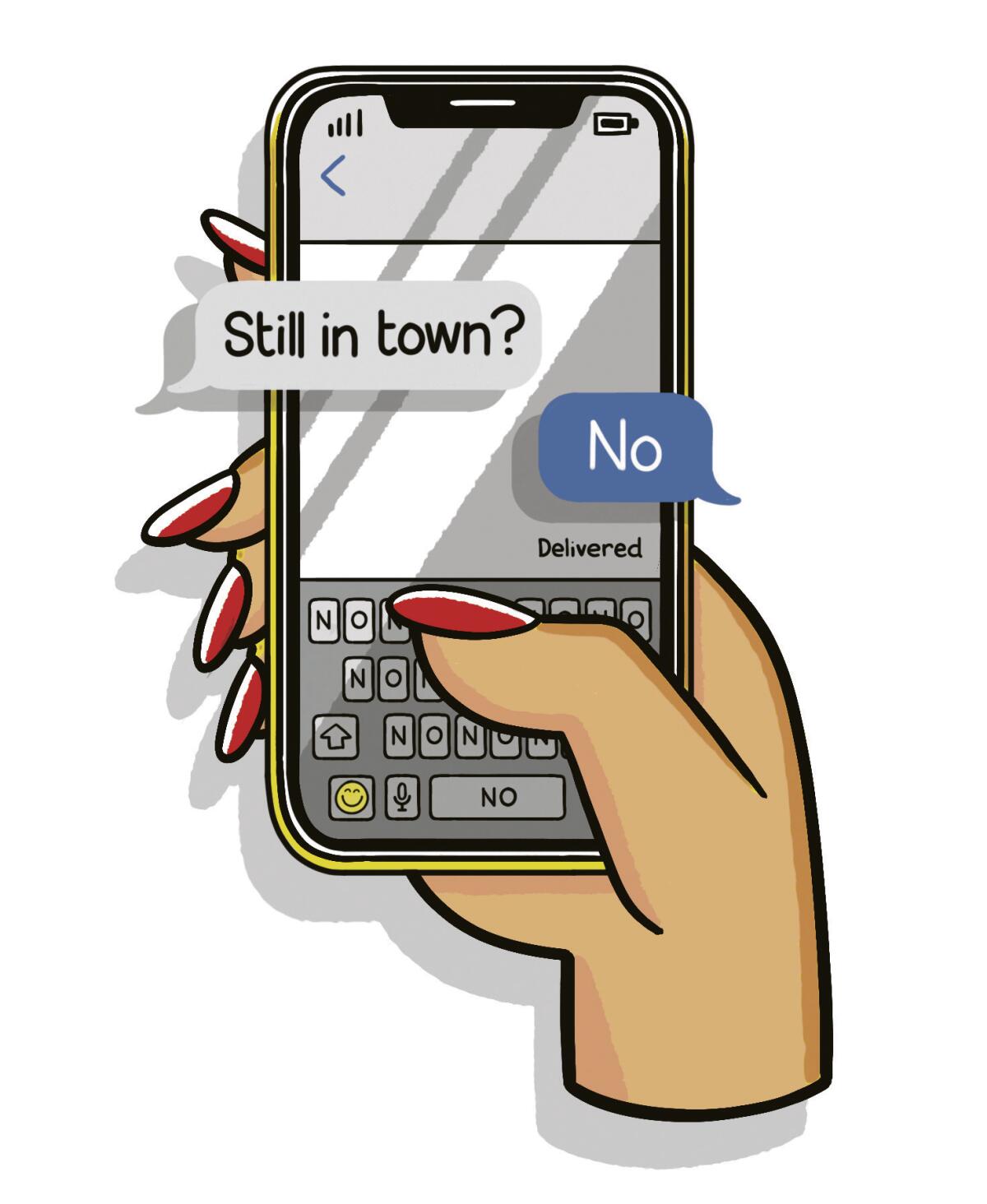We grew up close by, but our paths never crossed. Was it fate to meet now?

- Share via
After graduating from UC Santa Barbara, I was unemployed and heartbroken over a breakup when I moved back to Los Angeles. After a failed relationship with my polar opposite — an impulsive graduate student — I found myself yearning for familiarity. As a short, bookish Chinese American, I tried my luck on Tinder.
“You seem nearby,” was his opening message. His profile said he was only a mile away. “I’m in Chinatown, and you?” “Me too,” he replied. I looked through his photos. He was gracefully thin, with dark hair. He was half Asian and half white. He was attractive — like a hipster Henry Golding, but younger. He wore sunglasses in his photos, looking composed and cool. I felt self-conscious about my own profile, which displayed a snapshot of me in a pointy birthday hat. I asked how long he had been living in Chinatown. He said he was born and raised here, and I told him I was born here too. After comparing addresses, we realized we’d been neighbors. I wondered how we’d grown up so close yet never crossed paths.
Each time I called her, the conversation flowed, but she was always too tired to go out. Maybe I needed to take the hint?
We continued messaging. He sent terse replies, but I was fascinated — sharing a hometown somehow seemed intimate. In this small pocket of the city, I knew everyone in my age group. At least I thought I did. There was only one elementary school in the area. Many of my grade-school classmates were related to other classmates — distant cousins, at least — and many of their parents knew each other from the same village in southern China where they’d lived before emigrating. My parents walked around speaking Cantonese and Vietnamese. But with time, things were changing. New restaurants opened, other businesses closed.
We finally met, across the street from my elementary school. He was a foot taller than me and didn’t smile when greeting me. He wore sunglasses and khakis in the August heat and was more attractive in real life. We walked to Chinatown’s central plaza off Broadway and sat on a red bench under lanterns. Tourists walked by, taking photos of colorful buildings with pagoda-style curved roofs. He told me he was studying for his master’s degree and had worked in Hong Kong. His mom was from China, he said, and Hong Kong was his favorite city. In his free time, he liked biking and visiting the Central Library.
He didn’t ask me any questions. Was I boring? Not his type?
At first I felt really strong and empowered, like I was taking my power back and protecting my heart. As the days went on, though, and he didn’t follow up to see why I’d gone silent, I just felt sad and empty. Truth is, I hate the power struggle that so often comes with online dating.
“It’s changed so much here,” I said, searching for another topic. “Yeah,” he agreed, “It’s getting better.” I nodded, hesitant to mention how sad I felt seeing fried chicken joints with two-hour lines replace old familiar shops. He stood up abruptly and said, “We should go. My parents just texted me for dinner.” I hadn’t seen him check his phone. I figured it was an excuse to leave. He seemed stoic — like the men in my family. I wondered if I’d talked too little or if we didn’t have enough in common.
When I arrived home, he sent a text: “Nice hanging.” Surprised, I messaged back, “We should hang out again.”
For our next meet-up, he picked me up at night and drove to Elysian Park. While we walked through the park, I could see bits of downtown’s skyline. We passed a playground, and he did pull-ups on the monkey bars. He lay on the grass and let me lie on his jacket next to him. I listened as he talked about the parties he went to as an undergraduate and how he missed Hong Kong’s high-rises. He told me about a music festival he went to in Echo Park. His last relationship wasn’t monogamous, he said, but he preferred dating one person at a time.
Asking was my way of being flirtatious but asking was also the right thing to do, right? I’m not a caveman and I wanted her to know that. I also wanted to know what I had done wrong.
I wondered why he was finally opening up. He was suddenly trying to win my favor. It was working. I turned and kissed him.
I’d worn shorts because I thought the night would be thick and hot, but it was actually chilly. I was shivering, and he wrapped his arms and legs around me, enveloping me.
Later that week, he flew back to Yale, where he was studying architecture. I tried to play it cool by being aloof.
Two weeks later, he texted, “Hey I’m coming to New York.” I was perplexed and sent question marks in reply. After all, I was still in Los Angeles. Did he text me by mistake? He never responded.
“I’m confused,” I told a friend. I turned our encounters over and over in my head, wondering if I had been too boring, unattractive or callow.
“Stuff happens,” she said, “but don’t blame yourself.”
He didn’t contact me again for several months. Then he began texting when he was back in town on school breaks. One night we went to Griffith Park to find a spot to hang out. But he became annoyed and noted I was being extra quiet.
When his next school break rolled around, he’d texted and asked to meet, but I declined.
I walked through my neighborhood passing small bakeries filled with elderly Chinese wielding walking canes. I knew the community inside and out. I knew the people, the restaurants, the culture, the history. I thought I could know a boy from three meetings in our hometown, but I couldn’t.
A few months later, I moved to Hong Kong to teach English. I was having dim sum with my dad, who was visiting, when I received a text from him. It read, “Still in town?” For the first time, I could reply, “No.”
The author is a Los Angeles-based freelance writer.
Straight, gay, bisexual, transgender or nonbinary: L.A. Affairs chronicles the search for love in and around Los Angeles — and we want to hear your story. You must allow your name to be published, and the story you tell has to be true. We pay $300 for each essay we publish. Email us at LAAffairs@latimes.com. You can find submission guidelines here.
More to Read
Sign up for The Wild
We’ll help you find the best places to hike, bike and run, as well as the perfect silent spots for meditation and yoga.
You may occasionally receive promotional content from the Los Angeles Times.












